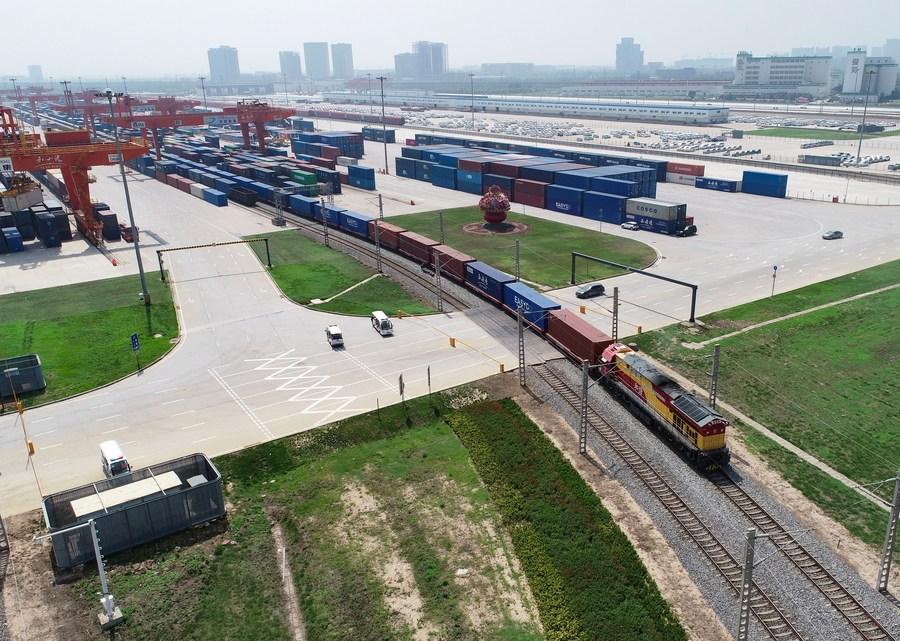
Editor's note: Since its inception in 2013, the Belt and Road Initiative (BRI) has transformed ideas into actions, from a vision into reality, and from a general framework into concrete projects. Evaluating the BRI's accomplishments over the last decade raises questions. How has the BRI advanced policy coordination, infrastructure connectivity, unimpeded trade, financial integration, and closer people-to-people ties? "BRI: A Road for the Common Good" is a five-part series that delves into the BRI's achievements of the past decade. The first essay explores policy coordination.
By Hussein Askary
The Belt and Road Initiative (BRI), proposed by China in 2013, will be considered in history books as the opportunity and inflection point in the 21st century from a world fraught with dangers to a world that is charting the path to common prosperity.
What makes the BRI so distinctly unique are its many characteristics. First, it differs from all other alliances and blocs that are based on exclusive clubs of nations with similar political, economic, cultural, and ideological structures.
As the recently issued white paper titled "The Belt and Road Initiative: A Key Pillar of the Global Community of Shared Future" pointed out, "policy coordination underpins BRI cooperation. Plans and measures for regional cooperation have been formulated through joint efforts to facilitate and speed up cooperation, making the BRI an important collaborative framework for international exchanges."
The policy coordination principle emphasizes the participation of all parties involved and substantial coordination with the development strategies of relevant countries and regions. This is also congruent with the UN Charter that has been side-stepped by Western powers in the past decades, establishing their own "rules-based order" which has created more chaos than order in the world.
The most recent example of the success of this principle was witnessed in West Asia, which preceded the other breakthrough of the China-brokered Iran-Saudi Arabia normalization of relations in March 2023. In his speech at the China-Gulf Cooperation Council (GCC) Summit in Riyadh on December 10, 2022, Chinese President Xi Jinping outlined the concrete economic, financial, and cultural measures China was willing to coordinate with GCC countries. The five priority areas for cooperation presented by Xi, including long-term trade in oil and gas in local currencies, infrastructure projects extending to nuclear power, space exploration and space technology, telecommunications and AI, digitalization, industrial projects, and transport infrastructure projects, should be of interest to study for any serious analyst.
In addition, China intends to intensify exchanges in education, culture, and especially language education in both parties. One day before the China-GCC Summit, President Xi and King Salman bin Abdulaziz Al Saud of Saudi Arabia reached a comprehensive strategic partnership agreement. This partnership is symbiotic and fully coordinated with the Saudi Vision 2030 strategy.
At the 10th Arab-China Business Conference held this June in Riyadh, 30 investment agreements worth $10 billion were signed between Chinese and Saudi Arabian entities, showcasing that economic, cultural, security, technological and scientific policies were fully coordinated.
Next was Central Asia countries, whose leaders participated in the historic China-Central Asia Summit in Xi'an, northwest China's Shaanxi Province, in May 2023. The Central Asia nations have adapted their national development plans to the BRI. Not only their trade has grown massively with China, but many infrastructural and agro-industrial projects are now also integral to the BRI and cooperation with China.
These examples prove that the BRI has created a platform for policy coordination among partner countries, providing them with enormous and precious developmental opportunities. Over the past decade, the BRI has also been a catalyst for world economic growth and provided feasible solutions for improving global governance.

Train No. X9015, a China-Europe freight train, leaving for Kazakhstan from Xi'an International Port in Xi'an, northwest China's Shaanxi Province, July 29, 2022. [Photo/Xinhua]
At the opening ceremony of the first Belt and Road Forum for International Cooperation in Beijing held in May 2017, President Xi remarked that "in pursuing the Belt and Road Initiative, we should focus on the fundamental issue of development, release the growth potential of various countries and achieve economic integration."
Now, China has signed more than 200 BRI cooperation agreements with more than 150 countries and 30 international organizations. The initiative has mobilized nearly $1 trillion of investment, reached more than 3,000 cooperation projects, created 420,000 jobs for the jointly built country, lifted nearly 40 million people out of poverty, and provided all countries with more development opportunities.
This leads us to the other unique feature of the BRI, which is the symbiosis between economic development and peace and security. For very long, Western powers have attempted to argue that economic development can only be achieved by first changing the political and social structures in developing nations. The models imposed from outside on these nations, mostly through regime change, have created unstable political powers. China has proven, through its own amazing journey from poverty to prosperity in the past four decades, that without economic development it would be impossible to establish stable political and social systems.
The BRI has also presented an ambitious and coordinated way of development financing, based on long-term results rather than immediate monetary benefits, and real economic development through large-scale infrastructure building rather than "aid" which simply perpetuates poverty. China has contributed greatly to creating new multilateral financing institutions like the Asian Infrastructure Investment Bank and the BRICS New Development Bank.
The BRI has created a model of bilateral and multilateral cooperation that transcends political, cultural, and ideological differences. This unique feature respects the sovereignty and dignity of the respective nations participating in it. Through policy coordination, the BRI in its 10th anniversary is presenting to our unstable world a gateway towards dialogue on achieving coordinated common prosperity, security, and peace.
The author Hussein Askary is vice chairman of the Belt and Road Institute in Sweden.

 中文
中文



